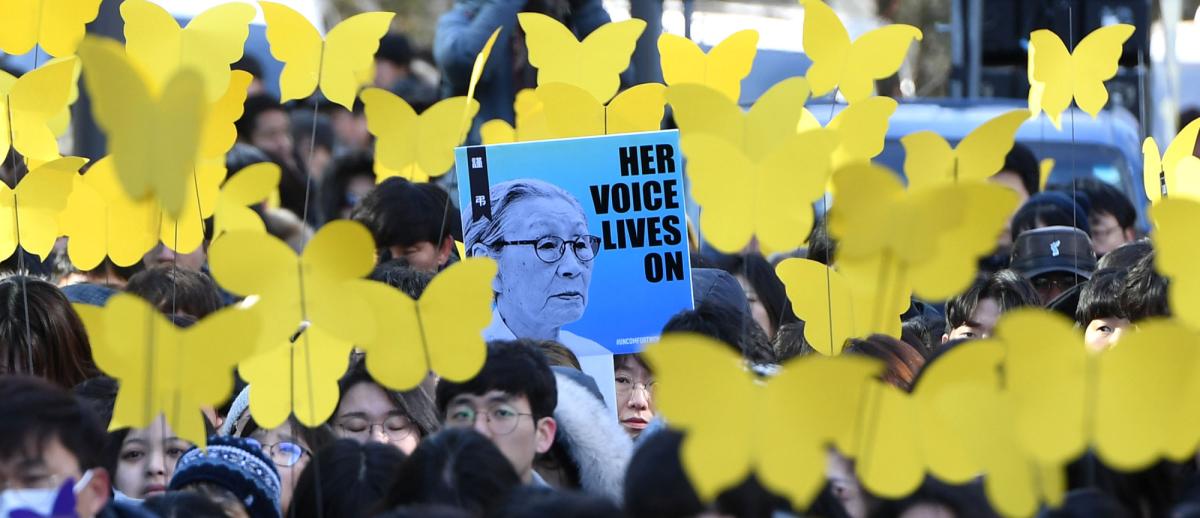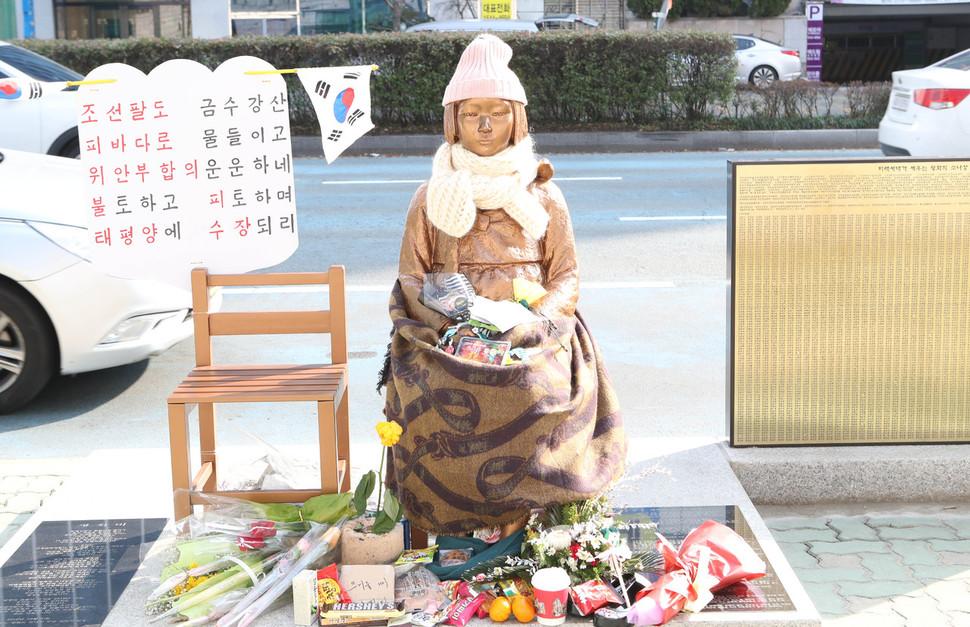Memory in Hypernationalist Times: The Comfort Women as Traveling Trope
archive


Funeral ceremony of former South Korean comfort woman and human rights activist Kim Bok-dong, near the Japanese Embassy in Seoul, February 1, 2019. (Photo: AFP-JIJI)
Memory in Hypernationalist Times: The Comfort Women as Traveling Trope
Why the current wave of nationalism and populism has occurred in such diverse national contexts at the same contemporary moment remains unclear. What is clear is the nearly universal use of history as an instrument in the nationalist arsenal. And in areas of geopolitical tension this weaponization of the past produces not solidarity but hostility. This is the case now in East Asia and Eastern Europe, where national memories of the Second World War have become central in regional geopolitics. How then does the “global memory space” figure in hypernationalist times?
Despite obvious differences, East Asian and Eastern European memories of World War II followed a similar chronology after the end of the Cold War. In the early 1990s war stories long frozen in place under the Soviet memory regime in Eastern Europe and the US-Japan alliance in East Asia cracked open in response to geopolitical change and nationalist imperatives. In the ensuing years Eastern Europeans retold the war (and the postwar that followed it) as a single narrative of combined Nazi and Soviet victimization, creating intense memory conflict between Russia and the Baltics, Poland, and other nations. At the same time in East Asia, China and South Korea challenged Japan to break out of the comfortable Japanese-American story of the Pacific War—from Pearl Harbor to Hiroshima—and finally confront decades of colonial rule in Korea and eight years of aggressive total war in China from 1937 to 1945. The result was heated international contention over what Chinese and South Koreans call Japan’s “history problem.” In both regions the wartime past was wielded in the name of the nationalist present.
Yet these national and regional memories also played out in a global context. In the decades since the end of the war, a global memory culture had evolved, which included expectations of apology and compensation for wartime injustices, changes in international law relating to war crimes and crimes against humanity, and the right of memory as both a civic and a human right (in UN terminology, the right to the truth). When war memories erupted anew in East Asia and Eastern Europe in the 1990s, they did so in a global context quite different from that of earlier years. In addition, over time war memory had generated what I think of as traveling tropes—memories that began as national, regional, or in some way specific to one place or group that came to have purchase across borders and cultures. The Holocaust is one such trope; Hiroshima is another. And during the 1990s the “comfort women,” sex slaves of the Imperial Japanese Army across wartime Asia, became a traveling trope as well.
Comfort Women in Public Memory
The comfort women came into public memory as a result of a convergence of discrete forces. The main drivers of memory change came from civil society, both in and outside Japan. In 1991 three South Korean former comfort women told their stories in public for the first time and lodged a lawsuit against the Japanese government. The government issued an apology in 1993, but the subject was by then in the hands of feminists and human rights activists, not only in Asia but at the United Nations, in Korean-Canadian and Korean-American activist circles, and among others appalled by the Bosnian “rape camps” during the war in the former Yugoslavia. Japanese progressives who had long countered the entrenched Pacific War story now had transnational allies who widened the circle of concern.
During the 1990s, mentions of the “Asian comfort women” appeared in all the juridical and human rights arguments that led to rape being designated a crime against humanity in the 1998 Rome Statute of the International Criminal Court. The testimonies of individual comfort women made the voices of the victims audible and, in what has been called the “era of the witness,” affectingly persuasive. The mass media magnified their personal pasts and connected the often far-flung vectors of transnational activism. By the end of the decade, the “comfort women” had become a traveling trope, one that stood globally for sexual violence against women, not unlike the way the Holocaust signified genocide the world around.
[O]ver time war memory had generated what I think of as traveling tropes—memories that began as national, regional, or in some way specific to one place or group that came to have purchase across borders and cultures.
During the 1990s, mentions of the “Asian comfort women” appeared in all the juridical and human rights arguments that led to rape being designated a crime against humanity in the 1998 Rome Statute of the International Criminal Court. The testimonies of individual comfort women made the voices of the victims audible and, in what has been called the “era of the witness,” affectingly persuasive. The mass media magnified their personal pasts and connected the often far-flung vectors of transnational activism. By the end of the decade, the “comfort women” had become a traveling trope, one that stood globally for sexual violence against women, not unlike the way the Holocaust signified genocide the world around.
In 1995, the Japanese prime minister apologized for Japan’s “colonial rule and aggression,” and from 1996 the Ministry of Education approved middle-school textbooks that for the first time included mention of the comfort women. Public opinion polls showed a shift in attitudes toward growing acknowledgment of Japanese aggression, approval of compensation and apology to victims of atrocities, and concern for relations with “neighboring countries” in Asia. These trends aroused a right-wing revisionist backlash, which called for more patriotism and less “masochistic history.” Despite the unreconstructed views of conservative politicians and the continued charges from those neighboring countries that the Japanese government had yet to address its “history problem,” it began to seem that Japanese public opinion about the comfort women had entered a new, more enlightened phase.
The Call of Patriotism
What happened between the late 1990s and 2015? How is it that by the seventieth anniversary of the end of the war, Japanese war memory, and the comfort women in particular, had become the main geopolitical issue between Japan, South Korea, and China, with echoes as far as the United States and Germany? Asian political leaders who had but mentioned the comfort women in their speeches on the sixtieth anniversary of the end of the war in 2005 now made them the center of diplomatic contention. And the Japanese government—under the same ruling party that had apologized for the comfort women in 1993—dug in and denied that force had been used in employing tens of thousands of young girls in military brothels across Asia. After nearly twenty-five years of national, regional, and global exposure to the “comfort women system,” after testimonies, field reports, and archival research in ten countries, after public opinion polls and streams of films, novels, television, and internet sites, after what even Japanese courts, which consistently ruled against the comfort women seeking compensation, admitted as the “irrefutable historical evidence” of their brutal experience—after all this and more, the Japanese government would now have the world believe that these women were prostitutes who voluntarily sought to provide their services. How did this happen?
It would be easy, and not completely wrong, to blame the right-wing nationalist regime of Prime Minister Abe Shinzō and his ministers. Abe has held the same reactionary views of the war since he was first elected to the Diet in 1993; in 2004 he said “there was no such historical fact” as the comfort women; in 2007 he denied that “coercion” was involved in staffing the military brothels, a position he holds to this day. But it is more complicated—and more disturbing—to realize that it takes more than an arch-nationalist prime minister to turn public memory rightward, and backward. It takes in fact the stirring up of national sentiment, usually for domestic political reasons, by the governments of each East Asian country, and it takes a fervent popular response to their patriotic calls.

Comfort woman statue outside the Japanese consulate in Busan, South Korea, Jan. 9, 2017. (Photo: Yonhap News)
Abe uses such calls to appeal to his political base. After 2011 when the Constitutional Court found the Korean government’s failure to pursue compensation for the comfort women unconstitutional, Korean politicians stepped up their diplomatic demands to Japan for apology and redress. Japanese spoke of “apology fatigue” and began, in ever greater numbers, to believe that the comfort women issue had been settled by a 2015 agreement announced as “final and irrevocable.” South Koreans, of course, disagreed, and the rancor intensified. By 2017-18 polls showed that more than three-quarters of both Japanese and South Koreans ranked the history problem as the main reason for the increasing mistrust between the two countries, with marked resentment among younger generations.
After the Chinese government intensified patriotic education in the wake of the Tiananmen protests of 1989, a new emphasis on Japan’s atrocities during the China War created hostility among generations of Chinese youth that flowed across the internet and spilled into the streets in anti-Japanese riots in 2005. Indeed, the most enduring outcome of the current geopolitics of war memory in East Asia may well be the millions of youth now steeped in what I call “hate nationalism,” which they are likely to carry forward the rest of their lives. I suspect that many of them agree that sex slavery is an evil, but that is not the issue. Patriotism is.
...it takes more than an arch-nationalist prime minister to turn public memory rightward, and backward.
The comfort women are well ensconced in the global memory space, symbolized by the statues of comfort women that civil society activists have erected around the world. They represent “restive memory,” which moves across borders and establishes solidarity.1 Each time Japanese officials lodge an official protest against them, it seems that a new statue goes up in another town or city. And it is the global memory culture that has created expectations of apology and redress, which continue to pressure Japan.
But nationalism has the power to trump transnationally recognized memories, as it is now doing in East Asia. Something similar may be said of Holocaust memory in Eastern Europe, where voices in Poland and elsewhere resist the “imposition” of Holocaust commemorative practices created over the decades in the Western part of the now expanded EU. In reconstructing their national memories since the 1990s, both Eastern European and East Asian societies have participated in the global memory space while rejecting some of its tenets. In the age of hypernationalism, mnemonic solidarity can be hard to come by.

Nationalist rally in Warsaw, February 2018, against perceived anti-Polish bias in the international outcry over proposed changes in Poland’s anti-defamation laws relating to the Holocaust. The individual’s sign (right of image) demands an end to “Jewish Aggression Against Poland.” (Photo: Janek Skarzynski/AFP/Getty)
1. Jennifer L. Allen, “National Commemoration in an Age of Transnationalism,” The Journal of Modern History 91 (March, 2019), p. 143.
Rumiko Nishino, Puja Kim, and Akane Onozawa, Denying the Comfort Women: The Japanese State’s Assault on Historical Truth (Routledge, 2018)
Gi-wook Shin and Daniel Sneider, Divergent Memories: Opinion Leaders and the Asia-Pacific War (Stanford University Press, 2016)
C. Sarah Soh, The Comfort Women: Sexual Violence and Postcolonial Memory in Korea and Japan (Chicago, 2008)



